n
Hannah Fidell // 2013 // 75 mins
 Films about illicit relationships often follow a very common formula; beginning with the initial sparks between two people who cannot or should not be together, moving through a series of lustful encounters and on to the eventual uncovering of their affair and the disastrous after-effects of the relationship on their lives. Hannah Fidell's second feature film rejects this tried and tested plot structure for a more minimal story that is solely confined to the middle segment of the relationship between Diana (Lindsay Burdge), a high school English teacher, and Eric (Will Brittain); one of her students. Stripping away the beginnings of Diana and Eric's relationship, stripping away the certain drama and controversy of what happens after they are found out, what Fidell leaves us with is a film made up of moments; intimate snapshots into a forbidden romance and it's eventual disintegration. While this approach to the subject matter is refreshing the resulting episodic structure isn't entirely successful as it leaves the film feeling somewhat incomplete and stretched out.
Films about illicit relationships often follow a very common formula; beginning with the initial sparks between two people who cannot or should not be together, moving through a series of lustful encounters and on to the eventual uncovering of their affair and the disastrous after-effects of the relationship on their lives. Hannah Fidell's second feature film rejects this tried and tested plot structure for a more minimal story that is solely confined to the middle segment of the relationship between Diana (Lindsay Burdge), a high school English teacher, and Eric (Will Brittain); one of her students. Stripping away the beginnings of Diana and Eric's relationship, stripping away the certain drama and controversy of what happens after they are found out, what Fidell leaves us with is a film made up of moments; intimate snapshots into a forbidden romance and it's eventual disintegration. While this approach to the subject matter is refreshing the resulting episodic structure isn't entirely successful as it leaves the film feeling somewhat incomplete and stretched out.
The films greatest strength is the strong lead performances from Burdge and Brittain, who feel completely natural in both the romantic moments and the darker reaches of the story. Diana is never demonised or depicted as predatory, rather a victim of her own bad judgement, but Burdge's cold, distanced portrayal sometimes makes it hard to fully connect or sympathise with her plight. The film is attractively shot and has a strong visual style that helps construct the mundane, repetitive lifestyle that Diana lives outside of her exciting relationship with Eric. The unexpected soundtrack is less successful and seems somewhat intrusive at numerous points throughout the film, where a more subdued score would have been better suited. A Teacher is a solid effort that demonstrates the potential of Fidell but never maximises on the potential of the film itself.
m
 Films about illicit relationships often follow a very common formula; beginning with the initial sparks between two people who cannot or should not be together, moving through a series of lustful encounters and on to the eventual uncovering of their affair and the disastrous after-effects of the relationship on their lives. Hannah Fidell's second feature film rejects this tried and tested plot structure for a more minimal story that is solely confined to the middle segment of the relationship between Diana (Lindsay Burdge), a high school English teacher, and Eric (Will Brittain); one of her students. Stripping away the beginnings of Diana and Eric's relationship, stripping away the certain drama and controversy of what happens after they are found out, what Fidell leaves us with is a film made up of moments; intimate snapshots into a forbidden romance and it's eventual disintegration. While this approach to the subject matter is refreshing the resulting episodic structure isn't entirely successful as it leaves the film feeling somewhat incomplete and stretched out.
Films about illicit relationships often follow a very common formula; beginning with the initial sparks between two people who cannot or should not be together, moving through a series of lustful encounters and on to the eventual uncovering of their affair and the disastrous after-effects of the relationship on their lives. Hannah Fidell's second feature film rejects this tried and tested plot structure for a more minimal story that is solely confined to the middle segment of the relationship between Diana (Lindsay Burdge), a high school English teacher, and Eric (Will Brittain); one of her students. Stripping away the beginnings of Diana and Eric's relationship, stripping away the certain drama and controversy of what happens after they are found out, what Fidell leaves us with is a film made up of moments; intimate snapshots into a forbidden romance and it's eventual disintegration. While this approach to the subject matter is refreshing the resulting episodic structure isn't entirely successful as it leaves the film feeling somewhat incomplete and stretched out.The films greatest strength is the strong lead performances from Burdge and Brittain, who feel completely natural in both the romantic moments and the darker reaches of the story. Diana is never demonised or depicted as predatory, rather a victim of her own bad judgement, but Burdge's cold, distanced portrayal sometimes makes it hard to fully connect or sympathise with her plight. The film is attractively shot and has a strong visual style that helps construct the mundane, repetitive lifestyle that Diana lives outside of her exciting relationship with Eric. The unexpected soundtrack is less successful and seems somewhat intrusive at numerous points throughout the film, where a more subdued score would have been better suited. A Teacher is a solid effort that demonstrates the potential of Fidell but never maximises on the potential of the film itself.
m
Paul Leni // 1927 // 108 mins
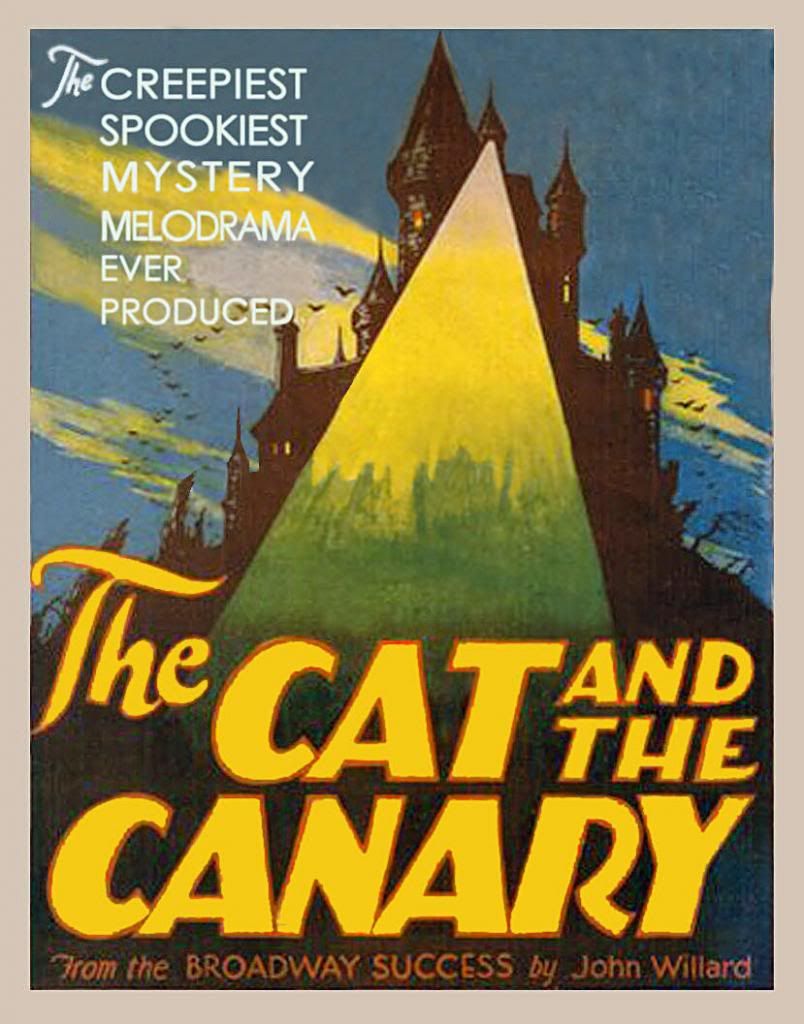 Regarded as the cornerstone of Universal's fantastic run of now classic horror films, German director Paul Leni's The Cat and the Canary is a huge technical achievement and gem of the silent era. The film is based upon the hugely successful black-comedy play of the same name from John Willard, and it's lasting influence is undeniable as it is responsible for a great many now-clichéd tropes of the genre. An ageing millionaire, Cyrus West, is hounded by his greedy family as he approaches death and is eventually driven insane by their presence. To spite them he dictates that his will be locked away and remain unread until the 20th anniversary of his death. When that date arrives West's remaining descendants gather in his decaying mansion but familial conflicts arise as suspicion, greed and the threat of an escaped psychopath take hold of the group, and they are forced to spend the night in the dark, old house.
Regarded as the cornerstone of Universal's fantastic run of now classic horror films, German director Paul Leni's The Cat and the Canary is a huge technical achievement and gem of the silent era. The film is based upon the hugely successful black-comedy play of the same name from John Willard, and it's lasting influence is undeniable as it is responsible for a great many now-clichéd tropes of the genre. An ageing millionaire, Cyrus West, is hounded by his greedy family as he approaches death and is eventually driven insane by their presence. To spite them he dictates that his will be locked away and remain unread until the 20th anniversary of his death. When that date arrives West's remaining descendants gather in his decaying mansion but familial conflicts arise as suspicion, greed and the threat of an escaped psychopath take hold of the group, and they are forced to spend the night in the dark, old house.
Leni's roots in German Expressionism are apparent, if in a slightly toned down form to better suit his new American audience, and the director masterfully uses techniques such as dissolves and superimposition to great effect. The creative cinematography is the films greatest achievement, and is in many ways responsible for creating much more horror than is present in the script. As Leni's camera drifts down a long corridor lined with billowing curtains, or lingers on heroine Laura La Plante as the hairy, clawed hand of her stalker reaches for her from behind it becomes clear just how influential The Cat and the Canary was for later horror films. As should be expected from a film from this era the acting is of the exaggerated, histrionic variety, but that doesn't prevent the humour and much of the fear from still translating well.
Though for a modern audience it is a light murder-mystery loaded with character archetypes and predictable story twists, taken in it's original context The Cat and the Canary is a revolutionary piece of cinema that paved the way for one of Classical Hollywood's most successful genres.
m
 Regarded as the cornerstone of Universal's fantastic run of now classic horror films, German director Paul Leni's The Cat and the Canary is a huge technical achievement and gem of the silent era. The film is based upon the hugely successful black-comedy play of the same name from John Willard, and it's lasting influence is undeniable as it is responsible for a great many now-clichéd tropes of the genre. An ageing millionaire, Cyrus West, is hounded by his greedy family as he approaches death and is eventually driven insane by their presence. To spite them he dictates that his will be locked away and remain unread until the 20th anniversary of his death. When that date arrives West's remaining descendants gather in his decaying mansion but familial conflicts arise as suspicion, greed and the threat of an escaped psychopath take hold of the group, and they are forced to spend the night in the dark, old house.
Regarded as the cornerstone of Universal's fantastic run of now classic horror films, German director Paul Leni's The Cat and the Canary is a huge technical achievement and gem of the silent era. The film is based upon the hugely successful black-comedy play of the same name from John Willard, and it's lasting influence is undeniable as it is responsible for a great many now-clichéd tropes of the genre. An ageing millionaire, Cyrus West, is hounded by his greedy family as he approaches death and is eventually driven insane by their presence. To spite them he dictates that his will be locked away and remain unread until the 20th anniversary of his death. When that date arrives West's remaining descendants gather in his decaying mansion but familial conflicts arise as suspicion, greed and the threat of an escaped psychopath take hold of the group, and they are forced to spend the night in the dark, old house.Leni's roots in German Expressionism are apparent, if in a slightly toned down form to better suit his new American audience, and the director masterfully uses techniques such as dissolves and superimposition to great effect. The creative cinematography is the films greatest achievement, and is in many ways responsible for creating much more horror than is present in the script. As Leni's camera drifts down a long corridor lined with billowing curtains, or lingers on heroine Laura La Plante as the hairy, clawed hand of her stalker reaches for her from behind it becomes clear just how influential The Cat and the Canary was for later horror films. As should be expected from a film from this era the acting is of the exaggerated, histrionic variety, but that doesn't prevent the humour and much of the fear from still translating well.
Though for a modern audience it is a light murder-mystery loaded with character archetypes and predictable story twists, taken in it's original context The Cat and the Canary is a revolutionary piece of cinema that paved the way for one of Classical Hollywood's most successful genres.
m
Mathieu Kassovitz // 1995 // 98 mins
During a riot that took place the night before a young man named Abdel was beaten unconscious by the police and an officer lost his gun. La Haine takes place over the following 24 hours and focuses on three of Abdel's friends Vinz (Vincent Cassel), a Jew, Saïd (Saïd Taghmaoui), an Arab and Hubert (Hubert Kounde), a black boxer, as they wander through the French suburban ghetto and witness the aftereffects of the riot on the locals. When Vinz is revealed to be the one who found the missing gun, he makes a vow to kill a cop should his friend die in the hospital.
Only the second feature film from actor/director Mathieu Kassovitz, La Haine is an unsettling glimpse into the hardships of life in the Parisian projects in the 90's. Kassovitz' camera is an indifferent spectator following the three young men through a day of heightened tensions and emotions, never judging nor condoning their behaviour; simply observing it. The theme of hate and the power that the emotion holds runs through the veins of this film, we see it present in many characters throughout the film but in Vinz especially. Cassel's performance is captivating, his Vinz is a frustrating, passionate character who is surprisingly relatable and, like the rest of the cast, feels very real thanks to the low-key script and naturalistic presentation. With the use of striking black and white cinematography the director finds the beautiful in the mundane, painting a gritty narrative in a handsome package. While the subject matter is very particular to the time and place in which it is set, La Haine achieves a great feat in being every bit as relevant today as it was almost 20 years ago. There is something intrinsically universal about these characters and their situation and I'm sure that the majority of viewers will recognise in them, someone they have encountered in their own life. The single-day, almost real time, structure of the film creates and intimately personal connection between the viewer and these characters, while the narrative achieves an unflinchingly brutal portrayal of their hardships without ever indulging in gratuitous on-screen violence.
m
During a riot that took place the night before a young man named Abdel was beaten unconscious by the police and an officer lost his gun. La Haine takes place over the following 24 hours and focuses on three of Abdel's friends Vinz (Vincent Cassel), a Jew, Saïd (Saïd Taghmaoui), an Arab and Hubert (Hubert Kounde), a black boxer, as they wander through the French suburban ghetto and witness the aftereffects of the riot on the locals. When Vinz is revealed to be the one who found the missing gun, he makes a vow to kill a cop should his friend die in the hospital.
Only the second feature film from actor/director Mathieu Kassovitz, La Haine is an unsettling glimpse into the hardships of life in the Parisian projects in the 90's. Kassovitz' camera is an indifferent spectator following the three young men through a day of heightened tensions and emotions, never judging nor condoning their behaviour; simply observing it. The theme of hate and the power that the emotion holds runs through the veins of this film, we see it present in many characters throughout the film but in Vinz especially. Cassel's performance is captivating, his Vinz is a frustrating, passionate character who is surprisingly relatable and, like the rest of the cast, feels very real thanks to the low-key script and naturalistic presentation. With the use of striking black and white cinematography the director finds the beautiful in the mundane, painting a gritty narrative in a handsome package. While the subject matter is very particular to the time and place in which it is set, La Haine achieves a great feat in being every bit as relevant today as it was almost 20 years ago. There is something intrinsically universal about these characters and their situation and I'm sure that the majority of viewers will recognise in them, someone they have encountered in their own life. The single-day, almost real time, structure of the film creates and intimately personal connection between the viewer and these characters, while the narrative achieves an unflinchingly brutal portrayal of their hardships without ever indulging in gratuitous on-screen violence.
m
Sandra Nettelbeck // 2013 // 116 mins
Overly sentimental films often get a bad reputation, mainly because they actively seek to evoke a strong emotional response from the viewer. Mr Mogan's Last Love was always going to be such a film; as a story centred around a genuine friendship between a beautiful young girl and an elderly widower can only pan out in so many ways. As the focus of the film, Michael Caine brings a vulnerability that we don't often get to see from the veteran actor. His attempts to cover his signature voice with an American accent are very distracting though and actually mar some of his more sentimental scenes. Poésy is wonderful as Pauline and a perfect companion to Caine. Though her character is considerably less developed the actress brings a sweetness and charm that perfectly balances her relationship and chemistry with Caine's more downhearted Mr Morgan. Gillian Anderson and Justin Kirk both provide ample support as Morgan's children, though the former has the stronger presence yet is used the least.
The story takes many predictable turns, though few of them detract from the overall impact of the film. Matthew and Pauline share an unconventional but heart-warming relationship and the two actors deserve full credit for elevating such an average plot. The stunning city of Paris is captured in a picture-postcard way by director Sandra Nettlebeck, and provides a suitably picturesque backdrop for the touching story. Mr Morgan's Last Love is a simple, intimate portrayal of an unlikely friendship and the way in which changes and helps two people who are at very different stages in their lives.
m
When his wife dies, retired American philosophy professor Matthew Morgan (Michael Caine) is left alone in Paris, struggling to adjust to life in a city where he doesn't speak the local language. When he meets a young dance teacher named Pauline (Clémence Poésy), the two strike up a friendship that seems to fill a void in each of their lives.
Overly sentimental films often get a bad reputation, mainly because they actively seek to evoke a strong emotional response from the viewer. Mr Mogan's Last Love was always going to be such a film; as a story centred around a genuine friendship between a beautiful young girl and an elderly widower can only pan out in so many ways. As the focus of the film, Michael Caine brings a vulnerability that we don't often get to see from the veteran actor. His attempts to cover his signature voice with an American accent are very distracting though and actually mar some of his more sentimental scenes. Poésy is wonderful as Pauline and a perfect companion to Caine. Though her character is considerably less developed the actress brings a sweetness and charm that perfectly balances her relationship and chemistry with Caine's more downhearted Mr Morgan. Gillian Anderson and Justin Kirk both provide ample support as Morgan's children, though the former has the stronger presence yet is used the least.
The story takes many predictable turns, though few of them detract from the overall impact of the film. Matthew and Pauline share an unconventional but heart-warming relationship and the two actors deserve full credit for elevating such an average plot. The stunning city of Paris is captured in a picture-postcard way by director Sandra Nettlebeck, and provides a suitably picturesque backdrop for the touching story. Mr Morgan's Last Love is a simple, intimate portrayal of an unlikely friendship and the way in which changes and helps two people who are at very different stages in their lives.
m
Céline Sciamma // 2011 // 82 mins
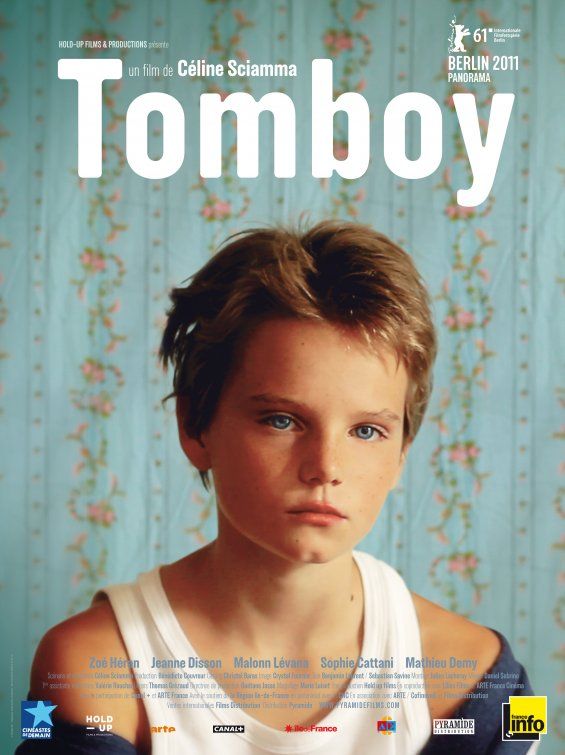 A beautiful exploration of discovering one's sexual identity at an early age, Tomboy follows Zoé Héran as Laure; a 10 year-old girl who, after moving to a new town during the summer, introduces herself to the local children as Mickäel.
A beautiful exploration of discovering one's sexual identity at an early age, Tomboy follows Zoé Héran as Laure; a 10 year-old girl who, after moving to a new town during the summer, introduces herself to the local children as Mickäel.
With a cast made up predominantly of children, director Céline Sciamma takes a step back and simply observes the way in which we interact at a young age and how little gender boundaries should actually matter. As a trans boy, Laure naturally seizes the opportunity to be seen as Mickäel, her true self, and though the eventual disintegration of this secret is inevitable we are able to savour the brief summer in which Mickäel becomes the dominant identity and is no longer a secret or dream. Héran is fantastic as Laure/Mickäel, capturing the complexities and frustrations of her character and carrying the film with a quiet confidence, never faltering along the way. We are witness to both the joy Mickäel feels in getting to be himself for once and the frustrations of Laure as she struggles to maintain her secret. As Laure's younger sister Jeanne, Malonn Lévanna is adorable and often hilarious, yet proves to be the most level-headed character in coming to terms with Laure's true self. She is in many ways the heart of the film, showing no bias in light of her sisters decision and realising that Mickäel is still the Laure that she loves, only a boy.
It would be very easy and conventional to depict this story in an exploitative, dramatic way, but Sciamma opts for a more subdued, contemplative tone that beautifully enhances the natural performances of the cast. We witness many situations that are to be expected from a story of this nature yet the presentation feels fresh and honest, and in spite of the troubles Mickäel encounters the film never fails in being a tender, uplifting coming-of-age story. Héran is quite simply a revelation and Tomboy a masterpiece of it's genre.
m
 A beautiful exploration of discovering one's sexual identity at an early age, Tomboy follows Zoé Héran as Laure; a 10 year-old girl who, after moving to a new town during the summer, introduces herself to the local children as Mickäel.
A beautiful exploration of discovering one's sexual identity at an early age, Tomboy follows Zoé Héran as Laure; a 10 year-old girl who, after moving to a new town during the summer, introduces herself to the local children as Mickäel.With a cast made up predominantly of children, director Céline Sciamma takes a step back and simply observes the way in which we interact at a young age and how little gender boundaries should actually matter. As a trans boy, Laure naturally seizes the opportunity to be seen as Mickäel, her true self, and though the eventual disintegration of this secret is inevitable we are able to savour the brief summer in which Mickäel becomes the dominant identity and is no longer a secret or dream. Héran is fantastic as Laure/Mickäel, capturing the complexities and frustrations of her character and carrying the film with a quiet confidence, never faltering along the way. We are witness to both the joy Mickäel feels in getting to be himself for once and the frustrations of Laure as she struggles to maintain her secret. As Laure's younger sister Jeanne, Malonn Lévanna is adorable and often hilarious, yet proves to be the most level-headed character in coming to terms with Laure's true self. She is in many ways the heart of the film, showing no bias in light of her sisters decision and realising that Mickäel is still the Laure that she loves, only a boy.
It would be very easy and conventional to depict this story in an exploitative, dramatic way, but Sciamma opts for a more subdued, contemplative tone that beautifully enhances the natural performances of the cast. We witness many situations that are to be expected from a story of this nature yet the presentation feels fresh and honest, and in spite of the troubles Mickäel encounters the film never fails in being a tender, uplifting coming-of-age story. Héran is quite simply a revelation and Tomboy a masterpiece of it's genre.
m


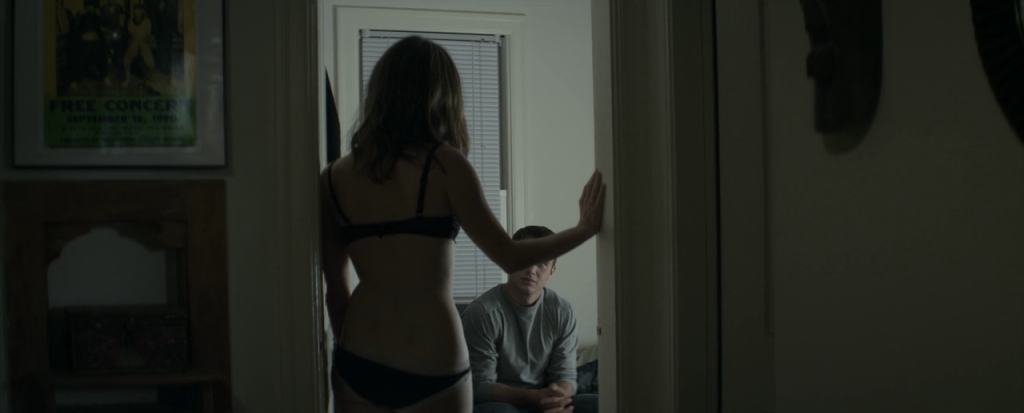

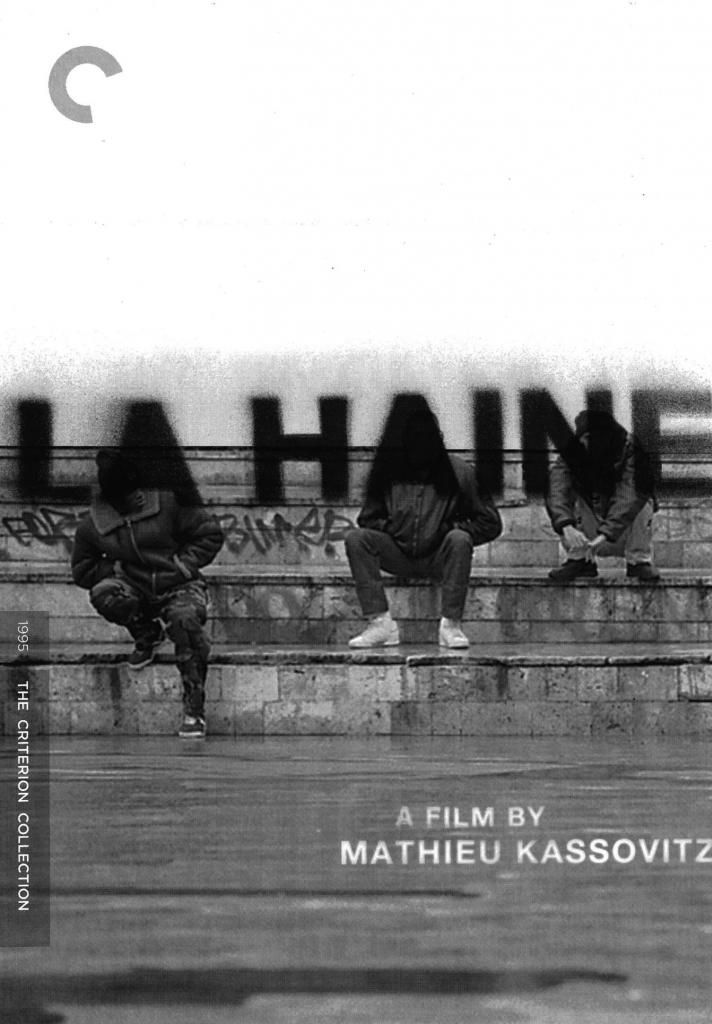
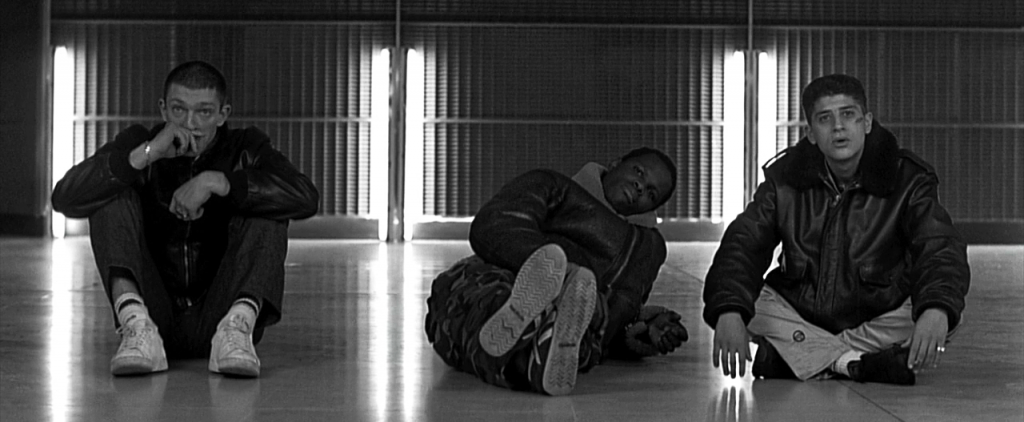
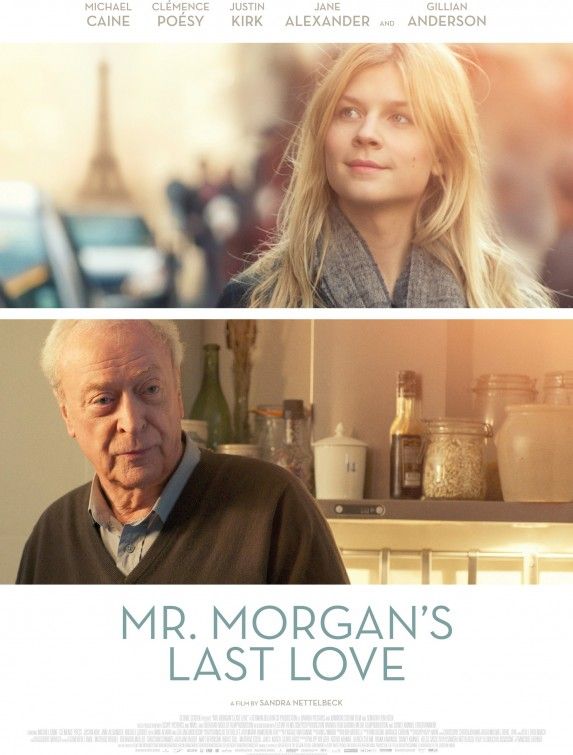
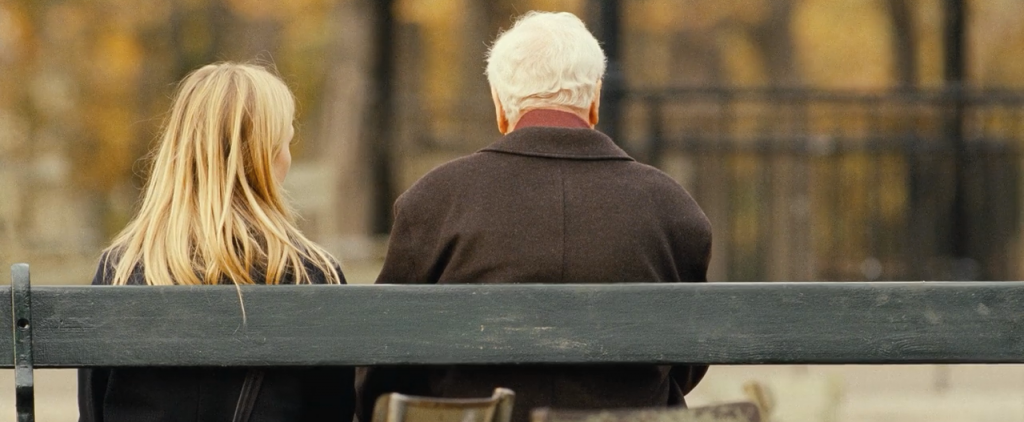

No comments :
Post a Comment